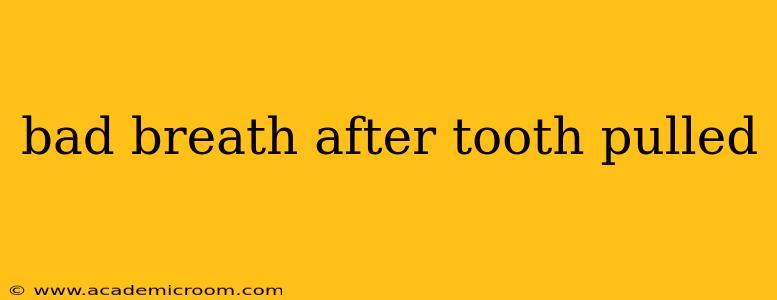Having a tooth extracted can be a somewhat unpleasant experience, but the recovery process can also bring unexpected challenges, such as persistent bad breath. While temporary bad breath is common after a tooth extraction, understanding its causes and how to manage it is crucial for a comfortable recovery. This comprehensive guide will explore the reasons behind post-extraction halitosis, offer practical prevention strategies, and advise when professional dental care is necessary.
Why Does My Breath Smell Bad After a Tooth Extraction?
Several factors contribute to bad breath following a tooth extraction. The primary culprits are often related to the healing process itself:
- Blood Clots: The formation of a blood clot in the extraction site is essential for healing. However, decaying blood, if not properly managed, can emit an unpleasant odor.
- Food Debris: The extraction site can trap food particles, particularly in the initial days of healing, leading to bacterial growth and subsequent bad breath.
- Infection: In some cases, an infection might develop at the extraction site, causing a noticeably foul odor. This is usually accompanied by other symptoms like pain, swelling, and fever.
- Dry Socket: This painful complication, also known as alveolar osteitis, occurs when the blood clot dislodges from the extraction socket. This exposes the underlying bone and nerves, leading to intense pain and a distinct foul odor.
- Mouth Bacteria: Normal oral bacteria can contribute to bad breath, and the disruption caused by the extraction can temporarily increase their activity.
How Long Does Bad Breath Last After a Tooth Extraction?
The duration of bad breath after a tooth extraction varies depending on individual healing rates and the presence of complications. In most cases, any odor should subside within a week or two as the extraction site heals. However, persistent bad breath beyond this timeframe warrants a visit to your dentist.
How to Prevent Bad Breath After a Tooth Extraction?
Proactive measures can significantly reduce the risk of developing bad breath after a tooth extraction:
- Maintain Oral Hygiene: Gentle rinsing with salt water (1/4 teaspoon salt dissolved in 8 ounces of warm water) several times a day can help cleanse the extraction site and reduce bacterial growth. Avoid vigorous rinsing or spitting, which could dislodge the blood clot. Brush and floss gently around the extraction site, avoiding direct contact.
- Proper Diet: Opt for soft, easily digestible foods during the initial healing phase. Avoid foods that can get lodged in the extraction site.
- Stay Hydrated: Drinking plenty of water helps flush out bacteria and keeps your mouth moist, reducing the likelihood of bad breath.
- Avoid Smoking and Alcohol: These substances can impair healing and increase the risk of infection, leading to worse bad breath.
- Follow Post-Operative Instructions: Adhering strictly to your dentist's instructions regarding medication, diet, and oral hygiene is paramount for proper healing and preventing complications.
Is Bad Breath After a Tooth Extraction a Sign of Infection?
While bad breath alone isn't definitive proof of an infection, it can be a warning sign, especially if accompanied by other symptoms such as:
- Severe pain: Pain beyond the expected post-extraction discomfort.
- Swelling: Significant swelling in the jaw or face.
- Fever: A temperature of 101°F (38.3°C) or higher.
- Pus: A yellowish or whitish discharge from the extraction site.
- Redness and inflammation: Noticeable redness and inflammation around the extraction site.
If you experience any of these symptoms alongside bad breath, seek immediate medical attention.
What Should I Do If I Have Bad Breath After a Tooth Extraction?
If the bad breath is mild and subsides after a few days with good oral hygiene, no further action might be needed. However, if it persists or worsens, contact your dentist immediately. They can assess the situation, rule out infections or dry socket, and provide appropriate treatment.
When Should I See a Dentist About Bad Breath After a Tooth Extraction?
You should schedule an appointment with your dentist if:
- Bad breath persists for more than two weeks.
- You experience any signs of infection, as mentioned above.
- You have concerns about the healing process.
Remember, prompt attention to any post-extraction complications can prevent more serious problems. Consulting your dentist ensures optimal healing and prevents prolonged discomfort. Taking proactive measures and seeking professional help when needed can make the recovery process smoother and more pleasant.
